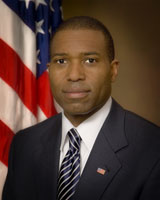Anger grows as DOJ fights DADT injunction

Tony West
The U.S. Department of Justice urged a federal district court judge Thursday not to issue an order that would stop enforcement of the military’s “Don’t Ask, Don’t Tell” policy.
The request is yet another instance of the incongruity some LGBT activists see between the Obama administration’s political statements—that it supports repeal of the federal law which bans gays from the military—and its legal activities– to defend and preserve that law.
And it comes just two days after the administration took a relatively passive approach to supporting repeal of Don’t Ask, Don’t Tell (DADT) in Congress during a crucial procedural vote on a defense spending bill.
“A court should not compel the Executive [branch] to implement an immediate cessation of the seventeen-year-old policy without regard for any effect such an abrupt change might have on the military’s operations, particularly at a time when the military is engaged in combat operations and other demanding military activities around the globe,” wrote Assistant U.S. Attorney General Tony West in a brief to U.S. District Court Judge Virginia Phillips September 23.
Judge Phillips, of the U.S. District Court for Central California, ruled September 9 that DADT violates the federal constitution’s First and Fifth amendment guarantees to free speech and due process. She ordered attorneys for Log Cabin Republicans, which pressed the lawsuit, to submit proposed language for her final judgment, “including a Permanent Injunction.”
Log Cabin did so. It proposed the U.S. military be permanently barred from enforcing DADT and ordered to “immediately suspend and discontinue any investigation, or discharge” underway against any servicemember anywhere.
West’s brief called that proposal “untenable.”
“If this Court were to enjoin all discharges under DADT throughout the world,” said West, “it would not only effectively overrule the decisions of numerous other circuits that have upheld DADT….” It would also be “imposing [its] view of the law on all the other circuits.”
West asserts that—if an injunction against DADT is warranted— it “must be limited to” current Log Cabin members in the military. And he argues that Defense Secretary Robert Gates has stated that implementing a change to the DADT law—to be successful— requires a carefully studied and crafted implementation plan. West urged the court to “defer entry of any injunction for a reasonable time so as not to interfere with” the DOD’s study and Congress’s consideration of repeal within the 2011 defense spending bill.
The Senate, on September 21, came three votes short of breaking a Republican-led filibuster against the annual defense spending bill. A number of Republican senators said they were supporting the filibuster out of their opposition to voting on DADT repeal before the DOD submits its report on implementing repeal. That report is due December 1.
The Office of Management and Budget released a statement on behalf of the Obama administration just hours before the filibuster vote, expressing support for the overall defense authorization bill. The statement also listed 15 areas of “concern.” The fifth issue listed was DADT; the statement said it supports the language that calls for a certification process leading to repeal of DADT.
A White House official said Thursday that, in addition to issuing the OMB statement, the White House legislative office did outreach to senators, as did one or two cabinet members. He said Vice President Joe Biden also made some calls.
Biden, himself, told MSNBC’s Rachel Maddow last week that he was “absolutely” actively involved in lobbying senators to vote to repeal DADT. But on Tuesday, his schedule included meetings at the White House all day on other subject matters.
Press Secretary Robert Gibbs issued a brief statement September 23 saying the DOJ brief in the Log Cabin Republicans v. U.S. case “in no way diminishes the President’s firm commitment to achieve a legislative repeal of DADT.”
Log Cabin Republicans Executive Director R. Clarke Cooper issued a statement saying he was not surprised by the DOJ brief but “extremely disappointed.”
“Many times on the campaign trail, President Obama said he would support the repeal” of DADT, said Cooper. “Now that it’s time to step up to the plate, he isn’t even in the ballpark.”
During a Democratic Party event in New York the day after the failed filibuster vote, a man interrupted President Obama’s remarks, holding up a sign and shouting “Don’t Ask, Don’t Tell,” according to a White House media pool report. Obama initially ignored the man but later in his remarks acknowledged him, saying, “we’re going to reverse it.”
“But hold on a second,” said the president. “Think about what happened in Congress two days ago, where you got 56 Democrats voting to debate this issue and zero Republicans. . . . Some of those signs should be going up at the other folks’ events.”
“People are heckling for a reason,” said gay political blogger John Aravosis at AmericaBlog. “Obama and his inner circle have really messed up on the LGBT agenda. . . . The failure to pass DADT repeal rests with the President. And before the apologists start screeching that it was Congress and the Republicans, ask what Obama did to help pass the Defense Authorization bill. There’s a simple answer: Nothing. Not a word.”
At a Democratic Party dinner later that evening, there were no interruptions and the president made no remarks concerning Don’t Ask, Don’t Tell.
Meanwhile, LGBT activists working on repeal are angry at everybody, including the Obama administration.
“Why wasn’t the White House lobbying senators for the vote?” asked Aubrey Sarvis, head of the Servicemembers Legal Defense Network, in a commentary on Huffington Post September 23. “What happened to ‘the fierce urgency of now’? From the get go, the White House didn’t want a vote on the ban until after the midterm elections.”


Leave a Reply